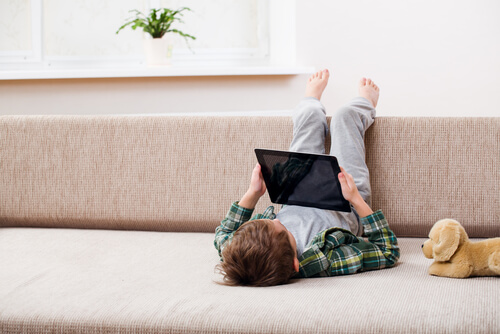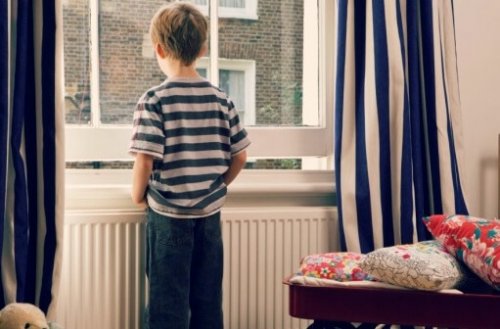At What Age Can a Child Stay Home Alone?

Giving your child the autonomy to stay home alone could mean a fair amount of anxiety for you. There will always be risks, but there are things you can do to minimize them.
We know that children grow up and gradually become less dependent on you to be with them each and every moment. So, the question remains: at what age can a child stay home alone?
There are countries that have passed legislation penalizing parents for choosing to leave a child unattended, depending on the age of the young ones. The law obligates parents to find an adult to care for and supervise the minors.
We live in a society that is both independent and subject to external factors. As a mother, you may have a lot of fear, justified or not.
However, your children will get older and not always be by your side. This article offers a look at how to know what age is most appropriate to leave them at home alone.
The right perspective
As your child grows older, he or she will demand more independence. Obviously, they need to be prepared to handle this responsibility.
The first time you leave them alone, it won’t be easy. You have to have courage. Refrain from painting an overly pessimistic picture of what might happen.
As such, leaving your child home alone may be understood as part of their education. This will help them assume greater responsibilities.
Of course, this moment won’t simply come out of the blue. Preparation will play a key role in how your child adapts to the situation.
The fact that your child craves greater independence doesn’t mean that he or she is free from risk. Also, it doesn’t obligate you to let your child stay at home alone.

Recognizing the right time
If you’ve already made your decision, you should start thinking about the most appropriate time. Also, there doesn’t necessarily have to be a reason for leaving the child by him or herself.
You can also set up trials for short periods of time that serve as training for your child to stay at home alone.
Some say the best age is between eight and 12 years old, and that children must learn to experience your absence. But how will you know when they’re ready for it?
Preparing your child to stay home alone
Each child is a world unto him or herself, and there is no one better than you to determine the right time. Don’t let yourself be guided by what other parents are doing.
It’s also important that you don’t allow yourself to become overwhelmed by every imaginable situation.
If you take the following considerations into account, you can decide whether or not your child is the right age. You can also determine whether he or she has the necessary sense of responsibility to deal with your absence.
Ask yourself:
- Has he or she memorized your home address or phone numbers?
- Does he or she fulfill responsibilities around the house?
- Does he or she know what to do and how to respond when someone knocks on the door? What if someone calls on the phone?
- Has he or she proven cautious with strangers?
- Does he or she know who to go to near your home in case something happens?
- Does he or she know where the first-aid kit is and how to use it?
The answers to these questions will allow you to decide whether your child has reached a sufficient level of maturity to stay at home alone for a while.
“The answer to whether or not a child can stay at home alone will depend on each particular case and the circumstances of each family.”
And if an emergency happens?
You shouldn’t overlook the possibility of an emergency actually occurring. But if you put in the work ahead of time, your child will have a better chance of dealing with one successfully.
Of course, it’s impossible to account for every situation imaginable. However, in your daily conversations with your child, you can simulate situations.
Gauge their reaction by asking them what they would do in each case. Make sure not to overwhelm them.

The right reasons
Your reasons for leaving your child at home alone should be legitimate.
Remember that age alone is not enough of a guiding factor in determining whether your child can be left at home alone. There will always be other factors to consider. Take your child’s temperament and character into account.
The most advisable course of action is always to talk openly and honestly with him or her, and explain how to act in uncertain situations.
Likewise, it will be helpful to talk about the importance of embracing a culture of prevention and caution. The goal is not to create worry, but to foster awareness.
This will allow your child to mature and gradually take on responsibilities in life. This will help him or her attain independence in a progressive and responsible manner.
So, the answer to whether or not a child can be left at home alone will depend on each particular case and the circumstances of each family.
In any situation, the parents will always be responsible for reaching the right conclusion.
This text is provided for informational purposes only and does not replace consultation with a professional. If in doubt, consult your specialist.
